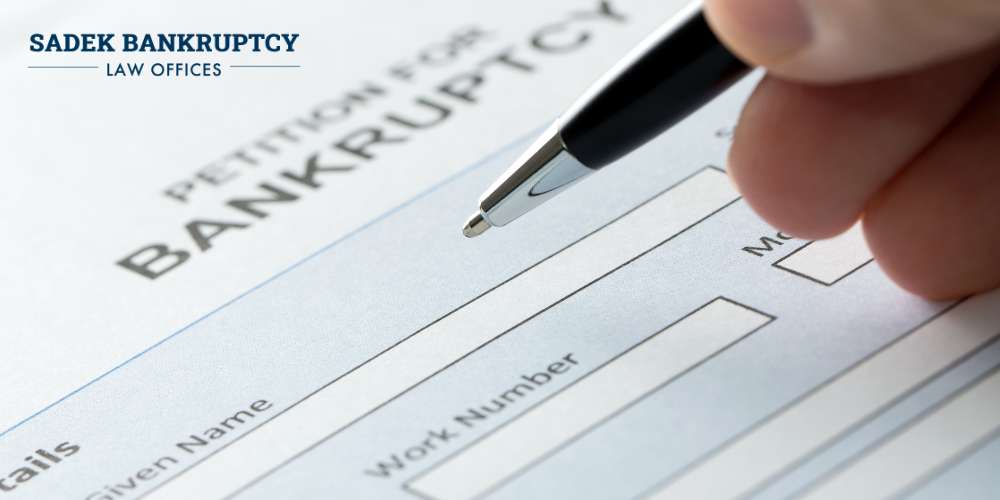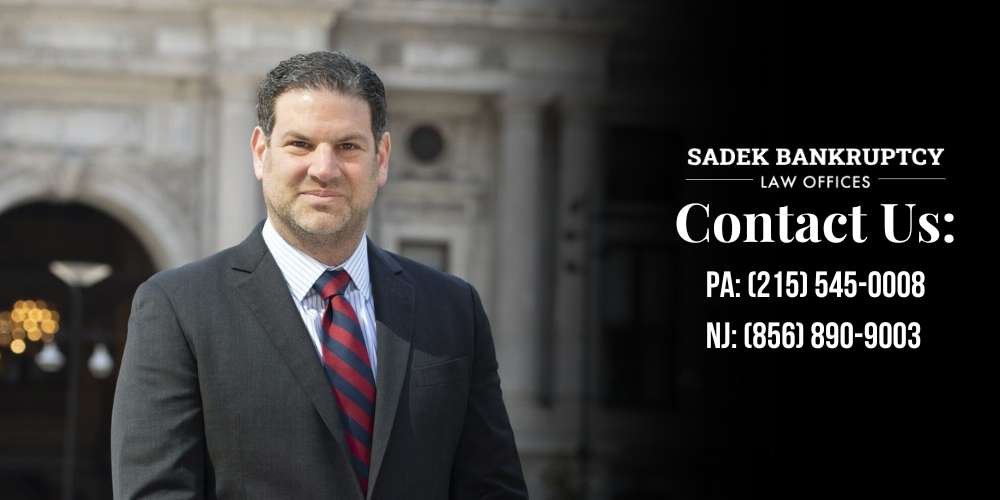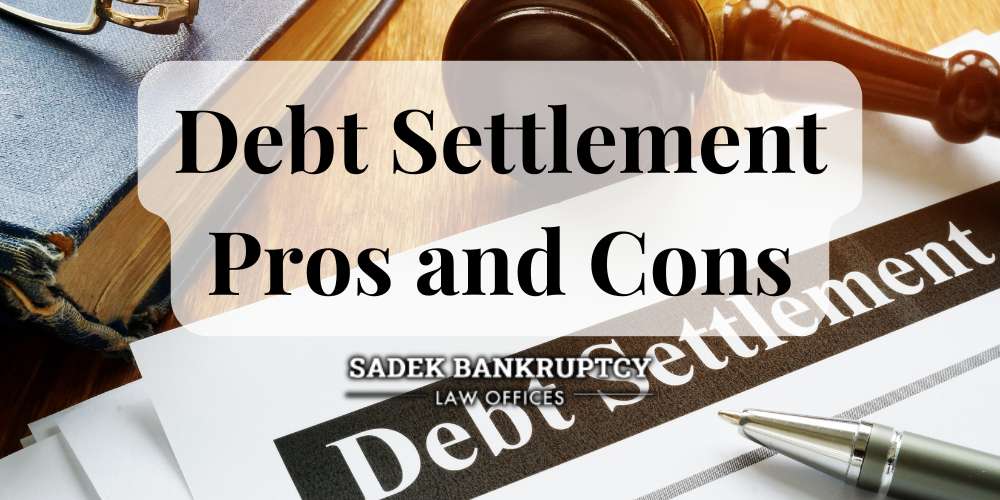What Is Debt Settlement?
Debt settlement is a financial strategy where you negotiate with your creditors to pay less than the total amount you owe, often settling for a fraction of your debt. The process can offer relief from overwhelming debt for some, but it’s important to weigh the debt settlement pros and cons carefully. Debt settlement works by reducing your total debt, but it can also significantly impact your credit score. Many debt settlement companies also charge fees for their services, so you may end up paying more than you originally owed.
Rather than working with shady debt settlement companies that only stand to make a profit, work with an attorney with experience in debt relief. At Sadek Bankruptcy Law Offices, our qualified debt relief attorneys have extensive experience helping Pennsylvania and New Jersey residents take back control of their finances. To get started and explore your options, call our office at 215-545-0008 to schedule a free consultation.
Debt Consolidation vs Debt Settlement
Debt consolidation and debt settlement are two distinct approaches to managing debt. A debt consolidation loan involves taking out a new loan to pay off multiple debts, simplifying the separate payments into one single monthly payment. A debt settlement program aims to reduce the total amount of debt you owe by negotiating with creditors to accept less than the full balance. While debt consolidation focuses on combining and lowering the cost of your debt, debt settlement seeks to reduce the overall debt amount through negotiation.
Debt Management vs Debt Settlement
A debt management plan involves working with a credit counseling agency to create a structured repayment plan, where you make a single monthly payment to the agency. The agency then distributes the funds to your creditors, often with reduced interest rates.
Debt settlement involves negotiating with creditors through a debt settlement provider to reduce the total amount of debt owed. This allows you to settle for less than the full balance. Debt management plans focus on managing and repaying debt in full over time, while debt settlement reduces the debt amount through negotiation.
Debt Settlement vs Bankruptcies
Debt settlement companies work with debtors in negotiating with their creditors to reduce the total debt amount owed. This allows them to pay off a portion of their debt for less than the full balance. However, this debt relief method could hurt your credit score.
Bankruptcy is a legal process that can eliminate or restructure your debts, offering a fresh financial start. Although it will also lower your credit score, it provides certain legal protections that debt settlement does not.
Credit Counseling vs Debt Settlement Company
Debt settlement involves working with a debt settlement company to negotiate with creditors for a reduction of your total debt. Credit counseling is offered by a credit counseling agency. A credit counselor can help you create a debt management plan to pay off your debts in full over time. Credit counselors focus on helping you manage your debt responsibly without reducing the principal owed.
How Does Debt Settlement Work?

Debt settlement works by negotiating with your creditors to reduce the amount of debt you owe, allowing you to pay off your debt for less than the full balance. The process typically begins when you or a debt settlement company contacts your creditors to propose a settlement.
Instead of continuing with regular payments, you stop paying your creditors directly and start saving money in a dedicated account. Once enough funds have accumulated, a lump sum payment is offered to the creditor as a final settlement. This process is one of many debt relief programs that have gained popularity in recent years.
While debt settlement can be an effective way to reduce your debt load, it also comes with risks. Your credit score will likely take a hit, and not all creditors may agree to settle. In fact, they are not legally obligated to agree to work with a debt settlement company. This is why it’s important to seek help from a debt relief attorney before deciding on debt settlement.
Is Debt Settlement a Good Idea for Your Finances?
Debt settlement can be a good option for some individuals who are struggling with overwhelming debt. By negotiating with creditors, debt settlement companies aim to lower the total amount owed, making it more manageable to pay off your debts. However, debt settlement has its downsides.
Creditors are not obligated to work with debt settlement companies, and some may refuse to settle or negotiate. This uncertainty can make debt settlement a risky strategy, as you might end up with no agreement in place, yet still face the negative consequences of missed payments and accrued interest.
Additionally, debt settlement doesn’t offer the same legal protections that bankruptcy does, such as an automatic stay that stops creditors from pursuing collection actions. While debt settlement can be a viable solution for some, it’s essential to weigh the potential risks and benefits carefully before deciding if it’s the right option for your financial situation.
Debt Settlement Pros and Cons

Like any financial strategy, debt settlement comes with its own set of risks and rewards that can significantly impact your financial future. Understanding the debt settlement pros and cons is essential for making informed decisions. If you’re hoping to find the best way to reduce or eliminate your debt, continue reading. We’ll explore the potential benefits and consequences of debt settlement.
Pros of Debt Settlement
Debt relief is possible with debt settlement, and many individuals find success with this method. Like other debt relief options, debt settlement has certain advantages. These advantages include:
- Settle for less than what you owe
- Pay off your debt sooner
- Stop creditor harassment
- Avoid bankruptcy
Settle for Less Than What You Owe
Debt settlement allows you to negotiate with creditors to pay off your debt for less than the full amount owed. This can significantly reduce your overall debt load, making it more manageable and allowing you to save money in the long run.
Pay Off Your Debt Sooner
By settling your debt for a lower amount, you may be able to pay it off faster than if you continue making minimum payments. This can help you achieve financial freedom sooner and reduce the stress of lingering debts like personal loans and credit card debt.
Stop Creditor Harassment
Once a settlement agreement is reached, the constant calls and letters from creditors and collection agencies can come to an end. This can provide much-needed peace of mind and allow you to focus on rebuilding your financial stability. Keep in mind that this is only the case if a creditor agrees to adhere to the terms of this debt relief option.
Avoid Bankruptcy
Debt settlement can be a way to avoid the more severe consequences of bankruptcy, such as long-term damage to your credit score and the public nature of bankruptcy filings. While it’s not without risks, working with a debt settlement company offers an alternative path to resolving debt without the legal ramifications of bankruptcy.
Cons of Debt Settlement
Working with a debt settlement company to lower your overall debt amount and having just one debt payment may seem like the ideal solution to financial trouble. However, debt settlement has certain drawbacks that you need to consider before deciding to try it. The disadvantages of debt settlement include the following:
- Creditors don’t have to negotiate with you
- High fees and interest rates
- Your credit will take a hit
- Settled debt may be taxable income
Creditors Don’t Have to Negotiate With You
One of the biggest risks of debt settlement is that creditors are not obligated to accept your settlement offer. If they refuse to negotiate, you could end up with unpaid debts, accumulated interest, and the negative impact of missed payments, without any reduction in your debt. Many debt settlement scams fail to mention that creditors are not required to work with them, which leaves debtors scrambling to find a solution.
High Fees and Interest Rates
The debt settlement industry makes its money by offering high interest debt relief options. These companies offer “debt relief,” but all while charging substantial fees and interest rates for their services. This can eat into the savings you would achieve through debt settlement. Also, if you were to stop making payments during negotiations, the interest rates and late fees would continue to accrue. This would put you right back into the situation you were in before.
Your Credit Will Take a Hit
Engaging in debt settlement will likely have a negative impact on your credit score. Settling a debt for less than what you owe is reported on your credit report and can lower your score, making it more difficult to obtain credit in the future.
Settled Debt May Be Taxable Income
The IRS may consider the amount of forgiven debt through settlement as taxable income. This means that while you may reduce your debt through settlement, you could face an unexpected tax bill, adding another layer of financial burden.
Is Debt Settlement Worth It?

Debt settlement can be a viable debt relief option for some individuals, but for others, it does more harm than good. It allows debtors to negotiate with their creditors to reduce the amount they owe, potentially leading to paying off debt for less than what they originally owed. Unfortunately, the risks often outweigh the benefits.
Creditors are not obligated to negotiate or agree with the debt settlement plan. They might refuse, which would leave you with growing debts, accumulating interest, and a damaged credit score. Also, the fees charged by debt settlement companies can be substantial, and the process can leave you vulnerable to unexpected tax liabilities.
Alternative personal finance strategies, such as bankruptcy or a balance transfer credit card, can offer less risky ways to manage and pay off your debts.
The bottom line: debt settlement is a viable option for some, but it is usually more trouble than it’s worth.
Debt Settlement vs Chapter 7
Chapter 7 bankruptcy offers a more comprehensive solution than debt settlement by legally discharging most or all of your unsecured debt, such as credit card debt. Unlike debt settlement, Chapter 7 offers protections such as an automatic stay, which stops creditors from pursuing collections, garnishing wages, or foreclosing on your home.
Debt Settlement vs Chapter 13

Chapter 13 bankruptcy provides a structured debt repayment plan that allows you to catch up on missed payments and keep valuable assets like your home and vehicle. This legal process offers protection against collection actions and garnishments, making it a more comprehensive solution for managing debt while keeping important assets. For those seeking a more secure approach to personal finance and debt relief, Chapter 13 is a more advantageous option than debt settlement.
Debt Settlement FAQs
How Long After Debt Settlement Can I Buy a House?
There are no restrictions on when you can buy a house after debt settlement. One of the most important factors to consider when buying a home is your credit score, which usually takes a hit after debt settlement. It can take a few years to build your credit enough to qualify for favorable interest rates.
Additionally, many lenders prefer for borrowers to wait at least two to four years before considering them for a home loan. During this waiting period, debtors can work with credit counseling agencies to rebuild their credit and financial standing.
Does Debt Settlement Hurt Your Credit?
Yes, debt settlement can significantly hurt your credit. When you settle a debt for less than the full amount owed, it is reported to the credit bureaus and appears on your credit report as a settled account. This can negatively impact your credit scores. A negative mark like this can lower your credit score and remain on your credit report for up to seven years.
Even though debt settlement can reduce your overall debt burden, the damage to your credit score can make it challenging to secure new credit in the future.
How Long Does It Take to Improve Credit Score After Debt Settlement?
Improving your credit score after debt settlement can take a long time, possibly several years. After settling a debt, your credit report will reflect the settlement status, which lowers your score. Over time, demonstrating responsible credit behavior will gradually improve your score. Most people see significant improvement in their score after three to five years of consistent work. Other debt relief options, such as credit counseling, can help your credit recovery by providing structured support and financial education.
How Long Does Debt Settlement Stay on Your Credit Report?
Debt settlement can remain on your credit report for up to seven years from the date of the original delinquency. The settlement will fall off your credit reports after that time, but it will significantly affect your credit score while it remains. You can mitigate the long term impact of the settlement by focusing on rebuilding your credit, having positive credit behaviors, and managing your finances responsibly.
Skip the Debt Settlement Companies – Contact Sadek Law Today for Debt Relief in Pennsylvania and New Jersey

At Sadek Bankruptcy Law Offices, we understand that each situation is unique. Our team of debt relief lawyers is dedicated to understanding your specific circumstances and goals. We aim to provide clear explanations of your legal options and recommend the most suitable debt relief strategies with compassion and a friendly approach. You can reach us anytime, 24/7, to schedule a consultation with a lawyer.
If you are considering debt consolidation or debt settlement to relieve debt, please give us a call. We will help you explore all of your options to ensure you make informed decisions about your financial future. We recognize the financial challenges our clients face, which is why we offer reasonable legal fees and convenient payment plans to ensure quality legal services are accessible to all our clients. Give us a call today at 215-545-0008 or fill out our online form to start your free consultation.





